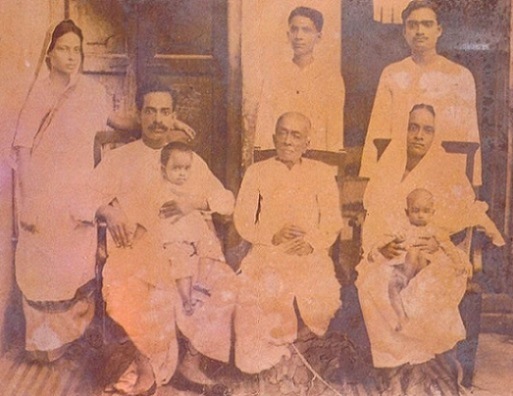Srila Prabhupada and his family, Allahabad, 1924—click to enlarge
[L-R]: (sitting) Srila Prabhupada and his son, Prayag Raj; his father, Gour Mohan, his eldest sister, Rajesvari, holding his daughter, Sulakshman; (standing) Prabhupada's wife, Radharani,
his nephew, Tulasi; his brother Krishna Charan
"Even the most learned man cannot understand the words, activities and symptoms of a person situated in love of Godhead."
(Caitanya-caritāmṛta Madhya 23.39)
"The Supreme Personality of Godhead and His devotees who come to this world are executing a mission, and therefore sometimes they act in a way that is very difficult to understand. It is said, therefore, vaiṣṇavera kriyā-mudrā vijñeha nā bujhaya: (CC Madhya 23.39) even if one is a very learned and intelligent scholar, he cannot understand the activities of a Vaiṣṇava. A Vaiṣṇava accepts anything favorable for executing his mission. But foolish persons, not knowing the purpose of such exalted Vaiṣṇavas, indulge in criticizing them. That is forbidden. Since no one can understand what a Vaiṣṇava does for the purpose of executing his mission, to criticize such a Vaiṣṇava is the offense called sādhu-nindā."
(Caitanya-caritāmṛta Ādi 15.22, Purport)
"A Vaiṣṇava is always engaged in the transcendental loving service of the Lord, and thus neither karmīs nor jñānīs can understand the activities of a Vaiṣṇava. It is said, vaiṣṇavera kriyā-mudrā vijñeha nā bujhaya: (CC Madhya 23.39) even the most learned man depending on direct perception of knowledge cannot understand the activities of a Vaiṣṇava."
(Caitanya-caritāmṛta Madhya 7.66, Purport)
"It is characteristic of advanced Vaiṣṇavas following the principles of bhakti that they think themselves ordinary human beings. This is not an artificial exhibition of humility; a Vaiṣṇava sincerely thinks this way and therefore never admits his exalted position."
(Śrīmad-Bhāgavatam 5.24.26, Purport)
"It is therefore said, vaiṣṇavera kriyā mudrā vijñe nā bhujhaya. A highly advanced Vaiṣṇava lives in such a way that no one can understand what he is or what he was. Nor should attempts be made to understand the past of a Vaiṣṇava."
(Śrīmad-Bhāgavatam 7.13.14, Purport)
"Kṛṣṇa's devotee is not subjected to material condition, even though his bodily features may appear materially conditioned. One should therefore not see a pure devotee from a materialistic point of view. Unless one is actually a devotee, he cannot see another devotee perfectly."
(Nectar of Instruction Text 6, Purport)
"If we consider the bodily defects of a Vaiṣṇava, we should understand that we are committing an offense at the lotus feet of the Vaiṣṇava. An offense at the lotus feet of a Vaiṣṇava is very serious. Indeed, Śrī Caitanya Mahāprabhu has described this offense as hātī-mātā, the mad elephant offense. A mad elephant can create a disaster, especially when it enters into a nicely trimmed garden. One should therefore be very careful not to commit any offense against a Vaiṣṇava."
(Nectar of Instruction Text 6, Purport)
"One is forbidden to observe the activities of a pure Vaiṣṇava from a material point of view. For the neophyte especially, considering a pure devotee from a material point of view is very injurious. One should therefore avoid observing a pure devotee externally, but should try to see the internal features and understand how he is engaged in the transcendental loving service of the Lord. In this way one can avoid seeing the pure devotee from a material point of view, and thus one can gradually become a purified devotee himself."
(Nectar of Instruction Text 6, Purport)
"An empowered person who is actually engaged in the confidential service of the Lord should not be treated as an ordinary human being, for it is stated that unless one is empowered by Kṛṣṇa, one cannot spread the Kṛṣṇa consciousness movement all over the world.
"A person cannot derive any spiritual benefit when he offends the lotus feet of a Vaiṣṇava. Everyone should therefore be very careful not to be jealous of an empowered Vaiṣṇava, or a śuddha-vaiṣṇava. It is also an offense to consider an empowered Vaiṣṇava an object of disciplinary action. It is offensive to try to give him advice or to correct him."
(Nectar of Instruction Text 6, Purport)
"Actually, an advanced Vaiṣṇava is to be respected more than Viṣṇu. As stated in the Padma Purāṇa, ārādhanānāṁ sarveṣāṁ viṣṇor ārādhanaṁ param: of all kinds of worship, worship of Lord Viṣṇu is the best. Tasmāt parataraṁ devi tadīyānāṁ samarcanam: and recommended more than worship of Viṣṇu is worship of the Vaiṣṇava."
(Śrīmad-Bhāgavatam 7.14.39, Purport)
.
